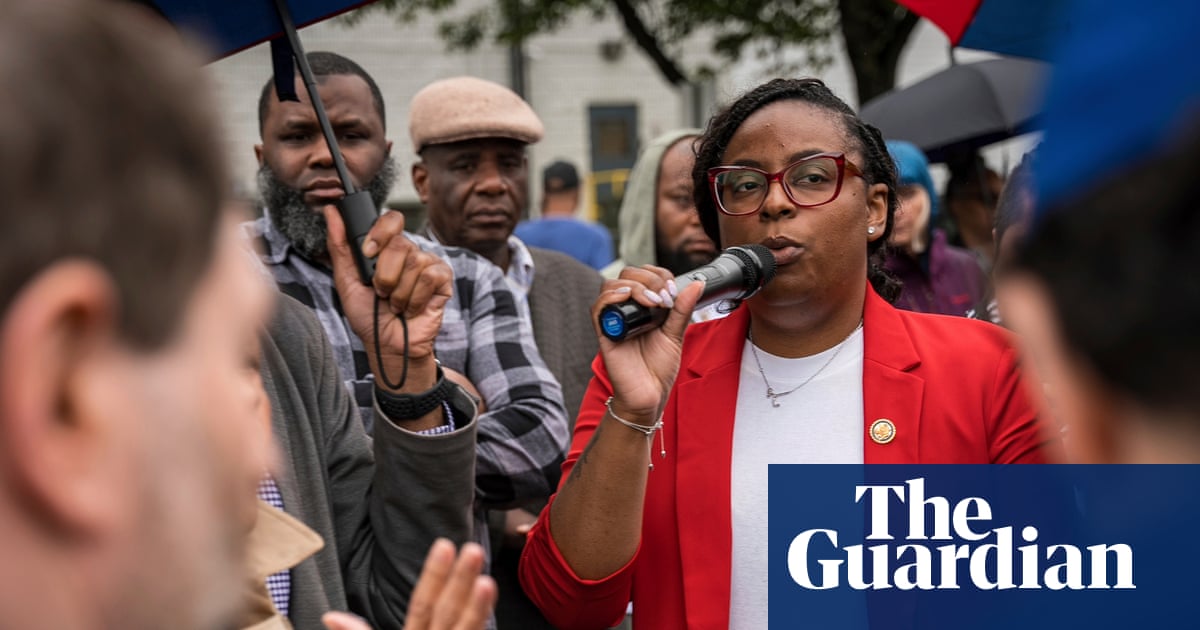For months, Ohio police officer Connor Grubb and his department attempted to hide his identity following an incident that saw him shoot and kill Ta’Kiya Young and her unborn daughter in a Kroger parking lot outside Columbus in August 2023.
Grubb, who on 21 November was acquitted of murder and other charges, claimed that Young, who was stopped for allegedly stealing, attempted to drive over him – which would make him a victim of a crime and eligible to protect his identity from public view through a legal provision called Marsy’s Law. Police footage of the killing shows Young slowly driving the car forward and to the right before Grubb fires through the windshield and into Young’s chest.
Although the Ohio supreme court later struck down Grubb’s anonymity claim, dozens of incidents from across the country have emerged in recent years in which police officers involved in fatal and violent incidents with the public have been able to hide their identities by invoking Marsy’s Law.
Marsy’s Law, or versions thereof, has been adopted in 12 states following the killing of a woman in California by her ex-partner in 1983. The idea is that victims of crime are afforded the right of anonymity.
But some civil rights groups fear it has become a protection tool for officers with violent tendencies.

“The way Marsy’s Law is being applied to police in the course of their duties acting on behalf of the state is inappropriate and a misuse of the law,” says Emily Cole of the organization Ohio Families Unite for Political Action and Change.
“Police and prosecutors determine who the victims are in any interaction and using Marsy’s Law to shield officer identities during violent interactions community members have with police presumes that law enforcement, as the arm of the state, have more rights than actual victims of their actions do.”
Across the country, dozens of cases have emerged in which police officers and the departments they work for have hid officers’ identities.
In Florida, the officers who shot and killed Jayden Baez, a 20-year-old man, outside a Target store in 2022 were not named after the local sheriff’s office used Marsy’s Law to avoid identifying them. Law enforcement claimed Baez attempted to ram his car into the officers, therefore making them crime victims.
Florida has seen several other similar cases that have involved killings or severe injury to civilians, while in North and South Dakota, law enforcement has sought to hide officers’ names in similar incidents.
In some cases, law enforcement officials have hidden identities even when the involved officers fail to officially report any injury to themselves. While some law enforcement districts require officers to invoke Marsy’s Law, others offer them a choice, according to a ProPublica investigation.
Given the controversy it has garnered, some cities in Florida have sought to ban its use by law enforcement officers, although police unions have opposed the move. In 2023, the Florida supreme court ruled, however, that the law does not include an automatic right to hide officers’ names.
Victims’ families and civil rights groups aren’t alone in their opposition to the provision. Legal experts are also voicing concern.

“Marsy’s Law violates defendants’ due process rights, increases the potential for wrongful convictions, and undermines the principles of the US legal system. It also dismantles several recent criminal justice reform efforts that are largely supported by the American people,” says Ráchael Powers, a criminal justice expert at the University of Cincinnati.
“This provision also decreases accountability – for example, it makes the work of civilian oversight boards very difficult because they cannot obtain the relevant information to conduct investigations.”
Emails sent by the Guardian to an organization affiliated with Marsy’s Law in Ohio, where the law was added to the constitution through an amendment in 2017, were not responded to.
Police officials, for their part, have attempted to play down the ultimate role Marsy’s Law has in the wider prosecution of a legal case, and claim that the anonymity it grants law enforcement is temporary at best.
“Victims of crime, whether police officers or plumbers, are entitled to victim rights protections that protect their privacy. An officer whose actions result in death that isn’t a crime victim shouldn’t be redacted,” said Jay McDonald, president of the Fraternal Order of Police of Ohio.
“Most victims of crime, including police officers, will have to testify at trial and will lose any anonymity they may have temporarily had from Marsy’s Law when they take the stand. The outright harassment, threats and violence that law enforcement faces on a daily basis are exactly why Marsy’s Law protections and others are necessary.”
Some state courts such as in Florida and Ohio, however, have ruled against the provision because of its controversial nature and its perceived exploitation by law enforcement. In December 2024, a court order ruled that Marsy’s Law does not protect law enforcement officers from lawful subpoena in the case of the police killing of Jamie Overstreet in Columbus in August 2023. Marsy’s Law was initially invoked by police after officers claimed they saw a gun next to Overstreet before he was shot.
But on Tuesday, Ohio’s supreme court ruled that officers’ identities could be hidden in another case involving a 2023 bank robbery in Hilliard that saw the suspect shot and killed and an officer injured.
In North Dakota, the name of an officer involved in a fatal shooting in 2022 that initially was hidden was later made public upon advice from the state’s attorney general’s office.
But experts say the wider tension created by a long history of violent law enforcement interactions with the public, especially with Black communities, means that divisions remain. Communities have been roiled when in some cases, police departments have been able to conceal the identities of officer-involved fatal shootings without ever having to invoke Marsy’s Law.
When unarmed Jayland Walker was shot more than 46 times and killed by police officers in Akron, Ohio, in June 2022, Ohio’s supreme court ruled that the eight officers who discharged their guns into Walker did not have to be publicly identified. Police claimed Walker had discharged a weapon at them during an earlier car chase.
For the family and legal representatives of Ta’Kiya Young and her murdered unborn daughter, whose killer, Grubb now walks free and is on paid leave from his law enforcement duties, the belief is that the law enforcement system is stacked against them.
“We have to have de-escalation. We cannot have officers pull a gun in a petty theft situation,” Young family lawyer Sean Walton told a press conference on 21 November.
“Two lives were lost. It’s not just Ta’Kiya, it’s an unborn daughter that does not get to step foot on this earth.”

 German (DE)
German (DE)  English (US)
English (US)  Spanish (ES)
Spanish (ES)  French (FR)
French (FR)  Hindi (IN)
Hindi (IN)  Italian (IT)
Italian (IT)  Russian (RU)
Russian (RU)  3 weeks ago
3 weeks ago
























Comments